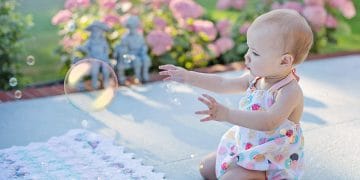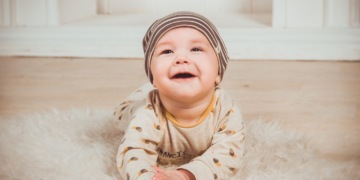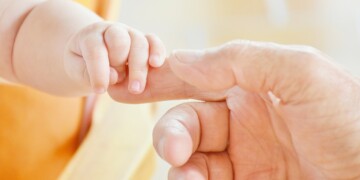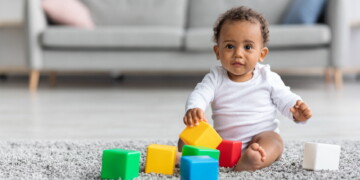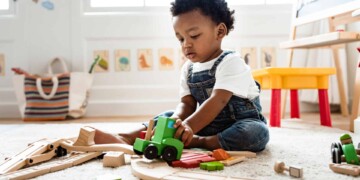Key Notes
- Brain Development: focused eye contact, increased crying, sleeping habits, and the startle reflex
- Breastfeeding Habits: demanding for feed, and gestures such as nuzzling against the breast
- Umbilical Cord: when it finally falls off, the following bath time, and getting your baby accustomed to a fix bathing routine
It’s the moment of true happiness. Your baby is finally beginning to settle down at home.
Your days are now circling around a repetitive routine that looks something like feeding, changing, sleeping, and repeat.
However, there are also countless sleepless nights and impromptu feeding times because newborns can be highly unpredictable.
During all of the subtle chaos, one thing is for sure: you are just starting off with the journey of parenthood.
Since the transition into becoming a parent can be overwhelming for some, here are a few basics to look out for during your 2-week-old baby’s development:
- Physical Developments: weight gain and an increase in breastfeeding.
- Brain Development: focused eye contact, increased crying, sleeping habits, and the startle reflex.
- Breastfeeding Habits: demanding for feed, and gestures such as nuzzling against the breast.
- Umbilical Cord: when it finally falls off, the following bath time, and getting your baby accustomed to a fix bathing routine.
2-Week-Old Baby Development: The Body
During week one, you may have noticed your newborn losing some weight. If you were beginning to get concerned, your worries are likely to disappear now. At 2-weeks-old, your newborn will be back to their birth weight or maybe even a little more than that.
Now would be a great time to start tracking your 2-week-old baby’s development, including their weight. Owing to all the breastmilk that is filled with nutrition, a newborn is likely to begin gaining weight by 14 days.
If your newborn is a little reluctant with breastfeeding, you do not need to worry. Weight gain and physical growth in newborns in directly proportional to the amount of nutrients they are consuming.
Important Tip: Remember to feed your newborn every 2-3 hours – they will need it.
2-Week-Old Baby Development: The Brain
At this stage, your baby’s brain is just beginning to register all of the things happening around them. A two-week-old baby will only be able to see about 25cm far – which is almost the distance between the mother and the baby while nursing.
Another important 2-week old baby milestone is that they will begin to have a startle reflex, especially when exposed to loud noises. This is a sign of brain development as they are now learning how to communicate with the world outside of the womb.
Additionally, your 2-week-old baby should also start crying whenever they are uncomfortable due to a diaper or are hungry for a feed.
Since the baby is still quite young, they will still be sleeping for the most part of a day – typically 16-18 hours. It is important to remember that the safest place for a baby to sleep is their own crib, so try to avoid making them sleep in places such as:
- The parents’ arms
- Baby seats
- Inside a vehicle
- Outdoors
- Full-sized beds
2-Week-Old Baby Milestone: Breastfeeding
After two weeks, both you and your newborn would become slightly familiar with the process of breastfeeding. A typical 2-week-old newborn is likely to consume about 9-12 feeds per day.
Since a majority of mothers are concerned about when to breastfeed their babies, the answer is simple: whenever they are hungry. Your 2-week-old baby is likely to begin demanding for breast milk through different actions, including:
- Suddenly waking up
- Crying
- Making slight noises
- Trying to lift their head
- Attempting to move arms or legs
- Sucking on lips
- Nuzzling against the breast
- Seeming restless or fussy
Remember that your 2-week-old is still in the development phase, and it is necessary to feed them between 9-12 times during each 24-hour period, counting from the beginning time of each feeding. Feeding patterns and preferences are unique to each baby, and it may take some time for you to figure that out.
Important Tip: Don’t wait for the little one to begin crying for you to feed them. Instead, look for little signs such as their newfound rooting reflex or slight lip-smacking sounds. If your newborn begins crying, chances are that they are now uncomfortably hungry.
2-Week-Old Baby Milestone: Umbilical Cord
One of the biggest milestones through the development of your newborn is the umbilical cord falling off. Typically, this happens during their second week and can be extremely exciting for new parents.
Once the cord has fallen off, it was finally time for a bath! Since newborns are in a comfortable environment inside the womb, chances are that they will be a fan of water and enjoy their first bath time. If not, they are likely to start enjoying it more as they grow.
To familiarize your baby with bath time, you can use a routine or a fixed time to bathe them each day. This way, your baby will know when it is time to take a bath and will be excited to follow a small routine activity with you.
Important Tip: Experts recommend that you should associate your 2-week-old baby’s bath time with their sleep time. By bathing your newborn and putting them directly into bed, they can easily become conditioned to the routine of falling asleep after bath time.
2-Week-Old Baby Milestone: Communication
By this stage, your newborn has understood the basics of how to communicate with you. They may be whimpering, moving rapidly, or wailing if they want your attention. At two-weeks, it is normal for a baby to be crying up to 6 hours per day. However, this should begin to settle down soon as they start to learn about alternatives to crying.
It is typical for a 2-week-old to start communicating with you through intense eye contact. Instead of other stimuli such as touch, newborns first learn to maintain eye contact and begin to recognize your face when you are close to them.
While the first smile may not be here yet, chances are that it is about to surprise you very soon!
Important Tip: If you want your newborn to stop crying, you can pick them up close and talk to them.
Since a 2-week-old baby can start recognizing faces, chances are that they will stop crying immediately.
Things to Look Out For:
- Seek medical assistance if you are experiencing any problems with breastfeeding. This could include bleeding, pain, or even increased discomfort.
- Check in with your own mental health. Caring for a 2-week old baby can be difficult, especially for new parents. While you care for the newborn, it is also important to care for yourself.
- Limit your newborns exposure to germs since their immune system is still developing. Optimally, it would be great to avoid big social gatherings or asking visitors to maintain their distance from the baby.
- Notice signs of illness in your newborn including fever, vomiting, or a sudden decrease in appetite. Please contact your medical practitioner if your baby shows any signs of sickness.
The Final Word
At 2-weeks-old, your baby is still growing and developing. There are only a few little changes to notice at this stage – since there is much more growth happening inside of you than in your baby.
Becoming accustomed to parenthood can be difficult in the beginning especially considering the hectic sleepless routine, but the love each parent has for their newborn is unconditional.
For a 2-week-old infant, there is still much time before any issues could arise in their development.
While it is easy to become overwhelmed and concerned about the little things regarding your 2-week-old baby’s development and milestones, we assure you that there is nothing to worry about!

















